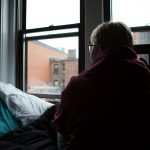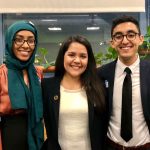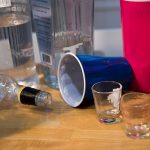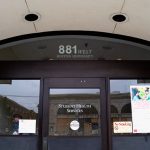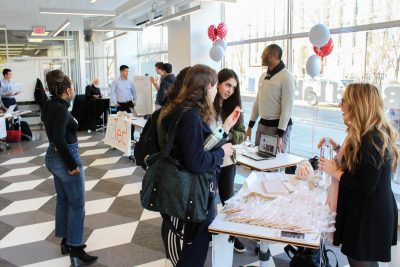
Members of the Boston University community gathered in the BUild Lab Tuesday evening to view showcases and listen to presentations about the future of certain industries by faculty from departments across BU.
Presenters gave lightning talks, limited to five minutes each, on topics ranging from gig economies to stem cells to artificial intelligence, matching the title of the event, “The Future of Everything.”
Ahlea Isabella, the marketing and communications manager for Innovate@BU, said the presentations were part of a larger goal to teach the BU community about innovation and entrepreneurial skills.
“Preparing for the future is a core component of Innovate@BU’s mission, especially as technology and the styles of careers and industries are drastically changing,” Isabella wrote in an email. “This event gives the BU Community an opportunity to hear how specific industries are changing, and what they can expect to see from them in the near future.”
Around 30 students and faculty members interested in entrepreneurship and the future of industries attended the presentations.
Jamell Sirleaf, a senior in the College of Arts and Sciences, said he regularly attends events at the BUild Lab to make connections and learn about happenings in the Boston area.
“I’ve been around the entrepreneurial scene at BU for the past two years, so coming to these events has become really important,” Sirleaf said. “… You just get to expose yourself to … many different viewpoints, and perspectives, and other companies and initiatives that have been going around Boston, so it’s really cool.”
Kadeem Clarke, a senior in the Questrom School of Business, said he and Sirleaf are currently working on their own entrepreneurial efforts.
“I’ve been involved in the marketing business, and [Sirleaf and I] are both working on a business named Agro, which focuses on helping to provide aid to families back in Liberia,” Clarke said.
Katharine Lusk, the executive director of BU’s Initiative on Cities, gave her lightning talk on the notion that cities are like living labs, or test beds, for experimentation and innovation. She used BU as her primary example of how a community can be utilized to do research ranging from environmentalism to technology.
“We are a city within a city,” Lusk said. “Some of this experimentation is already happening … think about your university community as a starting point for a test bed, which will expand with partnerships … to do more for the city of Boston.”
Product development engineer and Ph.D. student Raj Setty gave his talk on the future of biomedical engineering and his work on a new type of technology designed to autonomously treat diabetes.
Setty said he thinks it’s important to discuss the future of biotech because “so much of our future seems likely to rely heavily on these medical devices that are integrated into our everyday lives.”
“It is never too soon for students to gain exposure to the kinds of thoughts, considerations and development logistics that go into building and producing products like these that really have the power to improve quality of life,” Setty wrote in an email before the event.
Zoran Tiganj, a research scientist at the Center for Memory and Brain, spoke about the future of artificial intelligence.
Tiganj said in his presentation that it is currently difficult for AIs to remember multiple tasks and understand nuanced instructions. He said that if AI systems had internal structures and reasoning systems similar to those of the human brain, they could become more advanced.
Before his presentation, Tiganj said AI research combines the work of many different fields.
“AI is a very dynamic field, bringing together researchers from a wide range of disciplines,” Tiganj wrote in an email. “The large[r] BU community, with its emphasis on interdisciplinary research, has a great potential to contribute in many important ways to the future of AI.”
Noora Lori, a professor of international relations, closed the event with a presentation on Urban Refuge, an app developed by Lori and an all-female team of 25 students in a class on policy at BU.
Lori said the app, which is now in its final stages of development at Microsoft, will act as a resource to help refugees find aid and resources in their local areas. It will launch in Amman, Jordan.
Meaghan Delaney, a senior in the College of Arts and Sciences who worked on Urban Refuge, spoke afterwards about the goal-oriented nature of the class in which they made the app.
“Professor Noora Lori asked us to think about making solutions to world issues … or, as she said, not focusing on the problems but on solution-based approaches.” Delaney said.
In his talk, George Murphy, a professor of medicine and co-director of the BU Center for Regenerative Medicine, stressed the importance of collaboration among bright minds.
“The future of science is team science.” Murphy said.

